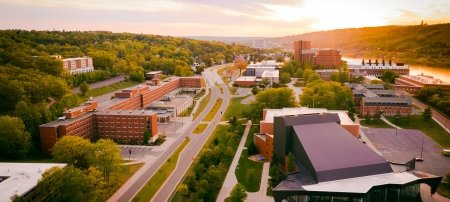As we approach a two-year milestone in pandemic response and stare down the omicron variant, COVID-19’s impacts have become increasingly wide — and increasingly disparate.
“Be kind, for everyone you meet is fighting a hard battle.” – attributed to Ian Maclaren, pen name of the Rev. John Watson
April 8, 2020: Four weeks since Michigan Tech announced a switch to remote instruction and two weeks since Michigan’s Stay Home, Stay Safe protocol took effect.
Campus is closed.
At home, an administrator stares at his computer screen, reflecting on the trepidation he initially felt at the transition to remote work. Most of those fears have been put to rest — he’d quickly grown comfortable with the technology, all Zoom meetings had run smoothly (for the most part) and interruptions were sparse. More time with the dog was an unexpected benefit. Thus far, the administrator thinks, time spent in lockdown has been minimally stressful and largely productive. But then the phone rings — the administrator’s aging parent, who falls within the virus’s high-risk group, has tested positive for COVID-19.
A few streets away, a researcher exits a Zoom call after her toddler crashed the meeting for the third time in 10 minutes. The call was intended to be a brainstorm with colleagues on how to keep research afloat in the face of a closed lab and looming deadlines. It had been scheduled during a timeframe in which she was responsible for child care; her partner will be watching the kids in the afternoon during the researcher’s online lectures. At this rate, she expects her work to be delayed by months, possibly years. She takes a deep breath, turns on a Disney movie (screen time restrictions are officially out the window) and tries to prepare for the afternoon’s classes.
Across town, an administrative assistant tries not to think about the rumors that have been circulating since the lockdown was announced. “Layoffs and furloughs are coming.” “The state’s economy might never recover.” Not too long ago, the assistant thought COVID-19 restrictions would be short-lived — a month-long blip in an otherwise normal year. With two kids in college and a partner laid off from the service industry, the assistant makes a mental note to take some time over the weekend to revisit the family budget and strike out all but the essentials. He prays the safety net will hold.
January 19, 2022: We’ve been at this for almost two years now. We’ve stayed six feet apart, worn face coverings and tried to flatten the curve. We’ve gotten tested, debated whether to homeschool our kids, and read up on the pros and cons of vaccination. We’ve shared all the memes, rolled all the eyes and cried all the tears (mostly in private, but sometimes in public).
Our latest hurdle is the omicron variant — which experts say causes milder illness but is far more contagious. Throughout the country, we’re facing new variations of a shutdown: facilities are closed and shelves are empty due to sick employees and supply chain disruptions. Parents in the local community are gearing up for what might be an inevitable announcement that schools need to close.
To put it mildly, we are beyond ready for the pandemic to end. As writer Glennon Doyle says, “We’re over it, but it’s not over.” The impacts of COVID-19 continue, and each of us is facing down different stressors and disruptors. All of us are fighting a hard yet different battle.
Throughout the fall 2021 semester, we dedicated Unscripted space for community members to share their personal pandemic stories and describe the challenges they face and the solutions they’re working on to uplift their research, scholarly work and creative endeavors. None of them told the same story and all of their stories are ongoing.
A Facilities building mechanic who can’t work from home. A principal investigator whose face-to-face data collection has been significantly disrupted. A faculty member still dealing with the fallout of the initial lockdown — kids at home, research halted, supply chain upended — more than a year after the strictest restrictions were lifted. Each of them (and all of us) could use a little grace and space as the pandemic drags on.
If you missed any of the installments in our pandemic impacts series, you can find them here:
- Researchers Break Digital Barriers
- Building Mechanics Can’t Work from Home
- Faculty Witness COVID-19 Chain Reactions
- Turning a Layoff into Creativity
- Virtually Possible (How the Pandemic Forced Us to Rethink Data Collection)
- Data Managers Find New Pandemic Tools
Michigan Technological University is an R1 public research university founded in 1885 in Houghton, and is home to nearly 7,500 students from more than 60 countries around the world. Consistently ranked among the best universities in the country for return on investment, Michigan's flagship technological university offers more than 185 undergraduate and graduate degree programs in science and technology, engineering, computing, forestry, business, health professions, humanities, mathematics, social sciences, and the arts. The rural campus is situated just miles from Lake Superior in Michigan's Upper Peninsula, offering year-round opportunities for outdoor adventure.






Comments